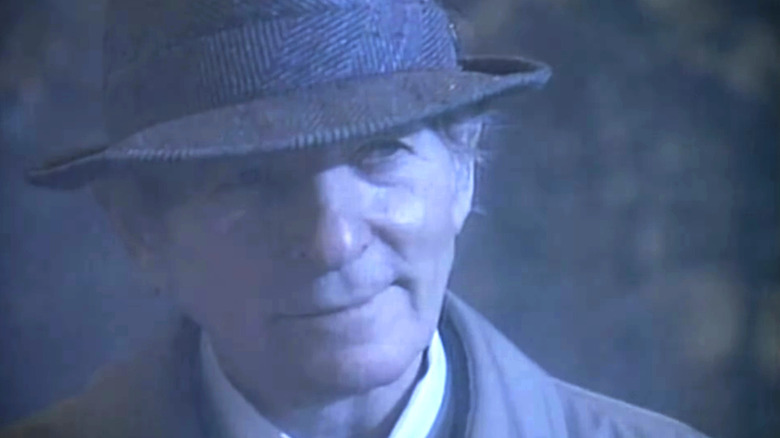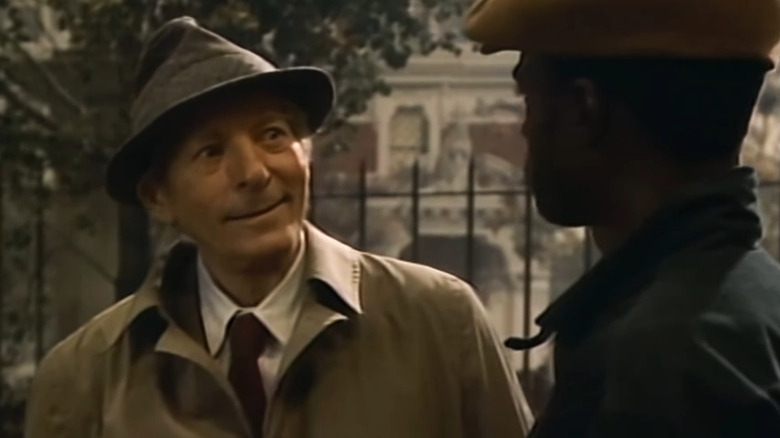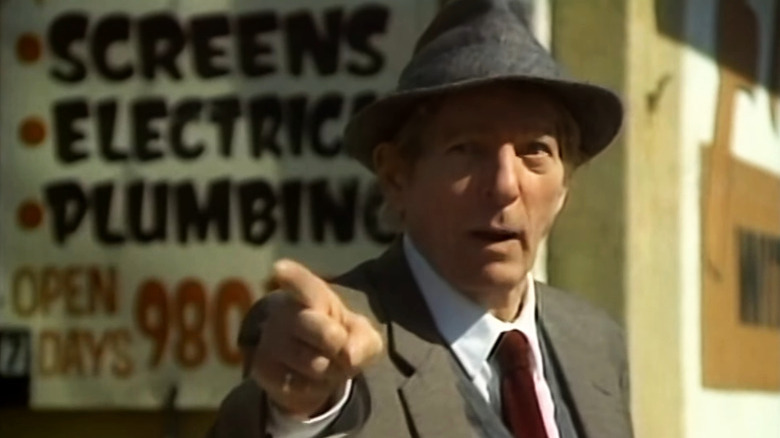Alan Smithee Directed An Award-Winning Episode Of The Twilight Zone
No director in Hollywood has a weirder résumé than Alan Smithee. Between 1969 and 2015, his credits included the Richard Widmark western "Death of a Gunfighter"; the horror comedies "Student Bodies" and "Ghost Fever"; the Jodie Foster thriller "Catchfire"; the franchise sequels "The Birds II: Land's End" and "Hellraiser: Bloodline"; episodes of hit TV series like "MacGyver" and "Tiny Toon Adventures"; and music videos for artists like Metallica, Destiny's Child, Wu-Tang Clan, Whitney Houston, and Jennifer Lopez.
But there's a reason for that: "Alan Smithee" is not a real person. It's a pseudonym invented by the Director's Guild of America for filmmakers to use when they no longer want to be credited for their work. This usually happens when they're replaced on a project, or believe that studio interference has altered the film so much that it no longer reflects their vision. That's why you'll sometimes see "Alan Smithee" credited on TV edits for well-known films by famous filmmakers, like David Lynch's "Dune" and Michael Mann's "Heat" and "The Insider." You may be watching the events of those Michael Mann films transpire, but as far as Mann is concerned, you're not actually seeing "his" films.
It didn't used to be common knowledge that "Alan Smithee" wasn't real, and that was the point. If everyone knew the name was fake, they'd also know that they were watching the result of a troubled production, and prepare themselves for the worst. But while a lot of Alan Smithee productions are terrible, there are exceptions. Sometimes they get good reviews. And in the case of "The Twilight Zone," sometimes they even win major awards.
The watch men
Sixteen years after Roger Ebert gave the first Alan Smithee film, 1969's "Death of a Gunfighter," a great review — and even singled the director out for praise (not knowing, at the time, that "Smithee" was actually Robert Totten and Don Siegel) — the fictional filmmaker got another big thumbs up. An Alan Smithee-credited episode of the reboot of "The Twilight Zone" won a prestigious Writer's Guild of America Award for Anthology Episode/Single Program.
"Paladin of the Lost Hour," which first aired in November 1985 and was written by sci-fi author Harlan Ellison, stars Hollywood legend Danny Kaye ("The Court Jester") as Gaspar, an old man who moves in with a friendly stranger, Billy, played by Glynn Turman ("Ma Rainey's Black Bottom"). As Gaspar shares his life story and Billy shares his trauma from the Vietnam War, the two men form an unlikely bond. But Gaspar is dying, and he needs Billy to become the caretaker of his most important possession: A pocket watch that has captured an hour of time that has been lost to humanity since the creation of the Gregorian calendar in A.D. 1582.
The magical conceit of "Paladin of the Lost Hour" is strange and not very well explained, but it's just a metaphor. Gaspar is an old man with no descendants and no other living friends. He needs to leave something behind or he, too, will be lost in time. By changing Billy's life and giving him a sense of purpose, Gaspar is also preserved forever. It's a tender story about mortality and legacy, told through an odd but unobtrusive fantastical conceit.
It's a beautiful tale. The acting is wonderful from both Kaye and Turman. And the director didn't like it one bit.
Unhappy Smithee friends
"Paladin of the Lost Hour" was originally directed by Gilbert Cates, a filmmaker with credits including "The Last Married Couple in America" and "Oh, God! Book Two." He was President of the Director's Guild, and Dean of the UCLA School of Theater, Film and Television from 1990 to 1998. He also produced the Academy Awards an incredible 14 times (a gig that even won him an Emmy).
But all those fancy credits didn't mean Cates had the final cut, and the director was not happy with the way his work on "The Twilight Zone" was edited in post. As fellow "Twilight Zone" director Joe Dante put it in a 2015 interview with ComingSoon.net: "[producer] Phil DeGuerre was notorious for post-production tampering and this was one of the first TV series edited on videotape. This allowed for much editorial mischief, as evidenced by director Gil Cates' complaint that his 'Paladin of the Lost Hour' episode was botched by DeGuerre in cocaine-fueled editing [...]."
Then again, even the notoriously gruff Harlan Ellison admitted that the collaborative process with "The Twilight Zone" producers made his story — which he called "one of the most important stories of my career" — even better. After a week of disagreements with "Twilight Zone" story editor Alan Brennert and associate producer Jim Crocker over the episode's climax, Ellison realized he needed to change it: "The light dawned, and I came to realize that I had written the scene with exactly the opposite interpretation it required. They were dead right; I was dead wrong."
Did Gil Cates overreact by taking his name off the episode, or was his version even better? Without seeing an edit that was to his liking, we may never know. But what we do know is that "Paladin of the Lost Hour" is a delightful episode of television, well worth the awards it received ... no matter who got the credit for directing it.


